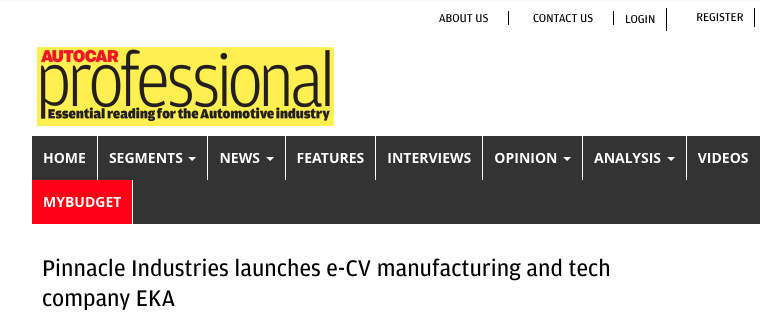Pune-headquartered automotive seating and speciality vehicles company Pinnacle Industries has diversified into electric commercial vehicles and solutions company with its new subsidiary EKA.
The company says EKA will manufacture electric commercial vehicles by developing sharable technologies and will democratize EV’s with best-in-class TCO (total cost of ownership) solutions and a sustainable ecosystem. It will design, manufacture, and supply a complete range of electric vehicles, fuel cell electric vehicles, and alternative fuel vehicles. Going forward the brand will also house components assembly and manufacturing, EV traction systems and EV energy storage systems among others.
Sudhir Mehta, chairman, Pinnacle Industries and EKA said, “EKA means ‘being together’ and to ‘become one’. EKA is committed to transforming businesses with its core values of environment focus, conscious innovation, and reliable mobility. EKA will open a new ecosystem of technology, manufacturing, and distribution to various parts of the country. This know-how and resources will be shared to reduce costs further and increase the viability of EV adoption. We are focusing on making the commercial vehicle electric mobility thrive on sustainability and offering lowest TCO solutions, making it good for businesses and environment collectively.”
EKA says its vision is to produce and share EV technology for mass adaptation. It is getting ready to introduce its first set of EV buses and LCVs to the market in the coming months. Going forward, the company will also introduce a smart lean factories approach, that will allow the utilization of existing infrastructure to create global EV revolution. The brand’s product range will include commercial battery electric vehicles (BEVs), plug-in hybrid electric vehicles (PHEVs) and fuel cell electric vehicles (FCEV).
EKA also aims to pioneer smart lean factory approach that requires minimum investment compared to conventional automobile manufacturing factories. This is achieved by designing the products in a way that eliminates large investments, including painting infrastructure and large fixtures. This revolutionary approach will reduce inventory and infrastructure costs and optimise logistics.


